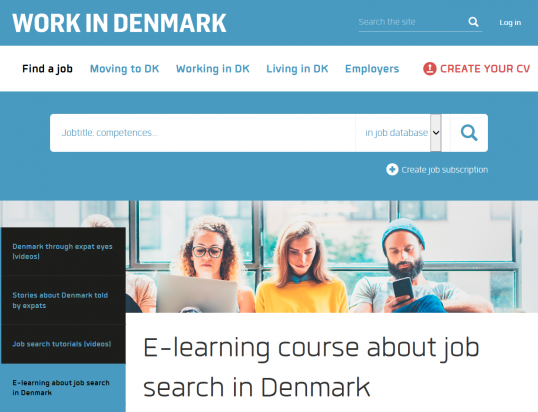Searching for a job – particularly in another country – can be a challenging process. In early March 2018, the EURES Denmark team decided to help those looking to work in their country by launching the online ‘Make It Work in Denmark’ course.
Designed to provide insight, knowledge and tips relating to finding a job in Denmark, the e-learning course is presented in English and consists of four modules:
- Job searching in Denmark: how to find vacancies, write an application and develop a CV that will meet the needs of Danish companies;
- Contacting companies and succeeding in job interviews: how best to get in touch with companies and present yourself at job interviews;
- Using LinkedIn effectively: how to optimise your LinkedIn profile for networking and job hunting;
- An introduction to Danish workplace culture: how to navigate a Danish workplace and deal with situations that may be unfamiliar.
The content for these modules includes real-life stories from international individuals who found work in Denmark, interactive exercise, videos about different subjects and practical tasks.
Flexibility is a key element of Make It Work in Denmark. The course’s online nature makes it a form of portable learning that can be accessed through mobile devices such as tablets and smartphones. Registration is open to all and operates on a rolling basis so that people can start the course when it suits them. The modules can also be completed in multiple sessions and revisited at any time, making the course a timeless resource for job hunters.
Over 170 individuals from a variety of countries have started the course so far and early reactions have been overwhelming positive. “I went through the modules and I have to say that they are really good!” Ágnes Kalmár, a civil engineer from Hungary, shares. “They have tons of information and inspiration; I will definitely revisit them often.”
Stacey, an Australian healthcare professional living in Aarhus, agrees. “I thought the modules were very engaging, interesting and informative. The information was relevant and presented in an easy-to-understand way. I particularly liked the variety in the way information was conveyed, as this helped keep the reader interested throughout the modules.”
Looking ahead and EURES Denmark’s aim is for 600 individuals to start the course each year. That target is already well on the way to being achieved in 2018 thanks to the high early uptake, which shows a clear enthusiasm for the advice, tips and knowledge the course has to offer job seekers.
Are you a job seeker looking to work in Denmark? Do you want to find out more about the Make It Work in Denmark e-learning course and how to take part? Simply create a profile on the Work in Denmark website to get started!
Related links:
Read more:
Working and living conditions in EURES countries
EURES Jobs Database
EURES services for employers
EURES Events Calendar
Upcoming Online Events
EURES on Facebook
EURES on Twitter
EURES on LinkedIn
EURES on Google+
Details
- Publication date
- 11 April 2018
- Authors
- European Labour Authority | Directorate-General for Employment, Social Affairs and Inclusion
- Topics
- EURES best practice
- External EURES news
- External stakeholders
- Hints and tips
- News/reports/statistics
- Social media
- Youth
- Related section(s)
- Sector
- Accomodation and food service activities
- Activities of extraterritorial organisations and bodies
- Activities of households as employers, undifferentiated goods- and services
- Administrative and support service activities
- Agriculture, forestry and fishing
- Arts, entertainment and recreation
- Construction
- Education
- Electricity, gas, steam and air conditioning supply
- Financial and insurance activities
- Human health and social work activities
- Information and communication
- Manufacturing
- Mining and quarrying
- Other service activities
- Professional, scientific and technical activities
- Public administration and defence; compulsory social security
- Real estate activities
- Transportation and storage
- Water supply, sewerage, waste management and remediation activities
- Wholesale and retail trade; repair of motor vehicles and motorcycles
